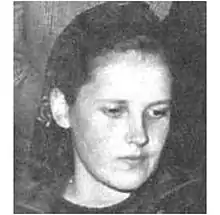Danièle Djamila Amrane-Minne
Danièle Minne (13 August 1939 at Neuilly-sur-Seine – February 2017[1]) was one of the few European women convicted of assisting the FLN during the Algerian War. Her mother Jacqueline Netter-Minne-Guerroudj and her stepfather Abdelkader Guerroudj, were both condemned to death[2] as accomplices of Fernand Iveton, the only European who was guillotined for his part in the Algerian revolt. Her mother was never executed, partly due to a campaign on her behalf conducted by Simone de Beauvoir; her stepfather was also freed.[3]
Danièle Djamila Amrane-Minne | |
|---|---|
 | |
| Born | August 13, 1939 Neuilly-sur-Seine, France |
| Died | February 11, 2017 |
| Resting place | Bejaia, Algeria |
| Nationality | previously French, Algerian |
| Years active | 1956-1962 |
| Organization | National Liberation Army (ALN) |
- See also Djamila Bouhired
Danièle Minne joined the struggle when she was 17, going underground under the nom de guerre of Djamila.[4] Minne was considered a woman combatant in the Algerian War known as a fidayat. She "planted at least two bombs during the Battle of Algeris, and joined the maquis in wilaya 3 in 1957".[5] A historian, Alistair Horne, described one of Minne's missions:
"The targets were the Otomatic, a favourite students's bar on the Rue Michelet; the Cafeteria opposite (second time over) and the Coq-Hardi, a popular brasserie…placed in the ladies' lavatory, Daniéle Minne's bomb in the Otomatic seriously injured a young girl and several others".[6]
Arrested and jailed in December 1956, she was sentenced, on 4 December 1957, to 7 years in prison by a juvenile tribunal.
Freed after independence in 1962, she wrote a PhD dissertation on the participation of Algerian women in the war, based on interviews with eighty-eight women between 1978 and 1986; the dissertation was later published as a book, Des femmes dans la guerre d’Algérie (Karthala, Paris). The book was the basis for the film Algeria: Women at War by Parminder Vir.[7]
Danièle Minne became Djamila Amrane by marriage in 1964. She later worked at the University of Algiers but, by 1999, was a professor of history and feminist studies at the University of Toulouse.
Des femmes dans la guerre d'Algérie
Amrane's Des femmes dans la guerre d'Algérie, "remains the major historical study on women's participation in the Algerian War"[5] and identifies not only why women were involved in the war, but the various roles of women combatants and their contributions to the FLN. Her research is based mainly on interviews with former FLN women activists[5] and consists of "eighty-eight interviews with Algerian women combatants".[6] As a militant herself, Minne "was in a privileged position to conduct person interviews that probe the intimate experiences of militant women".[6] However, it is also clear that as a former militant her work has been "influenced by her reconstruction and understanding of her own role during the war".[5]
Minne limits herself as a historian by making it clear through her cited testimony that women had indeed been tortured but chose to leave much unsaid in this regard. The rationale behind this was, "given the trauma inflicted upon torture victims, she did not feel that she could interview her subjects about their ordeal. In her view, their silence proved their wish to forget a traumatic episode".[6] In this sense, Minne's Des femmes dans la guerra d'Algérie "breaks the silence surrounding women's participation in the war, yet contributes to the silence concerning torture and its psychological consequences"[6] that would last for decades after Algeria's independence. It would not be until a decade later that the memoir of Louisette Ighilariz would come to light, thus revealing in more detail the nature of torture during the Algerian War.
Amrane also completed important research on the estimate of women who had participated in the Algerian War by using the register of the Ministry of Mujahidin.[5] She concluded that "there were 10,949 FLN-ALN female activists; 3.10 percent of the total number of FLN-ALN members".[5]
Works
Women and Politics in Algeria from the War of Independence to Our Day Research in African Literatures 30.3 (1999) 62-77
References
- Mujaheeda Danièle Djamila Amrane Minne passes away Archived 2017-02-13 at the Wayback Machine
- Andrée Dore-Audibert (1995). Des Françaises d'Algérie dans la Guerre de libération: des oubliées de la guerre de libération. ISBN 2-86537-574-9.
- James D. Le Sueur (2001). Uncivil War: Intellectuals and Identity Politics During the Decolonization. ISBN 0-8122-3588-6.
- Chris Kutschera. What happened to Algeria's Fighting Women?.
- Seferdjeli, Ryme (2012). "Rethinking the History of Themujahidatduring the Algerian War". Interventions. 14 (2): 238–255. doi:10.1080/1369801x.2012.687902. S2CID 161439319.
- Mortimer, Mildred (2012). "Tortured Bodies, Resilient Souls: Algeria's Women Combatants Depicted by Danièle Djamila Amrane-Minne, Louisette Ighilahriz, and Assia Djebar". Research in African Literatures. 43: 101–117. doi:10.2979/reseafrilite.43.1.101. JSTOR 10.2979/reseafrilite.43.1.101. S2CID 153986429.
- Parminder Vir (2002-07-08). "The mother of all battles". New Statesman.